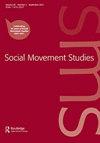{"title":"紧急时期的互助和团结政治:2019冠状病毒病大流行期间意大利的直接社会行动和临时性","authors":"Lorenzo Zamponi","doi":"10.1080/14742837.2023.2204426","DOIUrl":null,"url":null,"abstract":"From the spring of 2020, the COVID-19 pandemic and the social distancing measures introduced created a series of social problems and needs that were partially addressed in Italy as well as in other countries by grassroots mutual aid initiatives. This article analyses these initiatives as direct social actions: actions that do not primarily focus on claiming something from the state or other power holders, but instead on directly transforming some specific aspects of society by means of the very action itself. The article addresses the impact of the temporality of emergency on solidarity politics by employing a series of qualitative interviews and choosing to place the analysis of mutual aid initiatives that developed in the context of the COVID-19 pandemic in longer pathways of engagement in direct social action. While many of these initiatives were strongly rooted in the Italian social movement and civil society landscape and the choice to engage in mutual aid activities was the result of long years of reflection and planning, the article shows how strongly the temporality of emergency affected the nature of these initiatives, their development and their outcomes, in particular with regard to the extraordinary number of people who volunteered and their relationship with politicisation processes. Through this analysis, the article aims to contribute to the understanding of a crucial form of action and the influence of exceptional contexts on collective action. © 2023 Informa UK Limited, trading as Taylor & Francis Group.","PeriodicalId":47507,"journal":{"name":"Social Movement Studies","volume":"128 1","pages":""},"PeriodicalIF":2.5000,"publicationDate":"2023-04-18","publicationTypes":"Journal Article","fieldsOfStudy":null,"isOpenAccess":false,"openAccessPdf":"","citationCount":"0","resultStr":"{\"title\":\"Mutual aid and solidarity politics in times of emergency: direct social action and temporality in Italy during the COVID-19 pandemic\",\"authors\":\"Lorenzo Zamponi\",\"doi\":\"10.1080/14742837.2023.2204426\",\"DOIUrl\":null,\"url\":null,\"abstract\":\"From the spring of 2020, the COVID-19 pandemic and the social distancing measures introduced created a series of social problems and needs that were partially addressed in Italy as well as in other countries by grassroots mutual aid initiatives. This article analyses these initiatives as direct social actions: actions that do not primarily focus on claiming something from the state or other power holders, but instead on directly transforming some specific aspects of society by means of the very action itself. The article addresses the impact of the temporality of emergency on solidarity politics by employing a series of qualitative interviews and choosing to place the analysis of mutual aid initiatives that developed in the context of the COVID-19 pandemic in longer pathways of engagement in direct social action. While many of these initiatives were strongly rooted in the Italian social movement and civil society landscape and the choice to engage in mutual aid activities was the result of long years of reflection and planning, the article shows how strongly the temporality of emergency affected the nature of these initiatives, their development and their outcomes, in particular with regard to the extraordinary number of people who volunteered and their relationship with politicisation processes. Through this analysis, the article aims to contribute to the understanding of a crucial form of action and the influence of exceptional contexts on collective action. © 2023 Informa UK Limited, trading as Taylor & Francis Group.\",\"PeriodicalId\":47507,\"journal\":{\"name\":\"Social Movement Studies\",\"volume\":\"128 1\",\"pages\":\"\"},\"PeriodicalIF\":2.5000,\"publicationDate\":\"2023-04-18\",\"publicationTypes\":\"Journal Article\",\"fieldsOfStudy\":null,\"isOpenAccess\":false,\"openAccessPdf\":\"\",\"citationCount\":\"0\",\"resultStr\":null,\"platform\":\"Semanticscholar\",\"paperid\":null,\"PeriodicalName\":\"Social Movement Studies\",\"FirstCategoryId\":\"90\",\"ListUrlMain\":\"https://doi.org/10.1080/14742837.2023.2204426\",\"RegionNum\":1,\"RegionCategory\":\"社会学\",\"ArticlePicture\":[],\"TitleCN\":null,\"AbstractTextCN\":null,\"PMCID\":null,\"EPubDate\":\"\",\"PubModel\":\"\",\"JCR\":\"Q1\",\"JCRName\":\"POLITICAL SCIENCE\",\"Score\":null,\"Total\":0}","platform":"Semanticscholar","paperid":null,"PeriodicalName":"Social Movement Studies","FirstCategoryId":"90","ListUrlMain":"https://doi.org/10.1080/14742837.2023.2204426","RegionNum":1,"RegionCategory":"社会学","ArticlePicture":[],"TitleCN":null,"AbstractTextCN":null,"PMCID":null,"EPubDate":"","PubModel":"","JCR":"Q1","JCRName":"POLITICAL SCIENCE","Score":null,"Total":0}
引用次数: 0
Mutual aid and solidarity politics in times of emergency: direct social action and temporality in Italy during the COVID-19 pandemic
From the spring of 2020, the COVID-19 pandemic and the social distancing measures introduced created a series of social problems and needs that were partially addressed in Italy as well as in other countries by grassroots mutual aid initiatives. This article analyses these initiatives as direct social actions: actions that do not primarily focus on claiming something from the state or other power holders, but instead on directly transforming some specific aspects of society by means of the very action itself. The article addresses the impact of the temporality of emergency on solidarity politics by employing a series of qualitative interviews and choosing to place the analysis of mutual aid initiatives that developed in the context of the COVID-19 pandemic in longer pathways of engagement in direct social action. While many of these initiatives were strongly rooted in the Italian social movement and civil society landscape and the choice to engage in mutual aid activities was the result of long years of reflection and planning, the article shows how strongly the temporality of emergency affected the nature of these initiatives, their development and their outcomes, in particular with regard to the extraordinary number of people who volunteered and their relationship with politicisation processes. Through this analysis, the article aims to contribute to the understanding of a crucial form of action and the influence of exceptional contexts on collective action. © 2023 Informa UK Limited, trading as Taylor & Francis Group.


